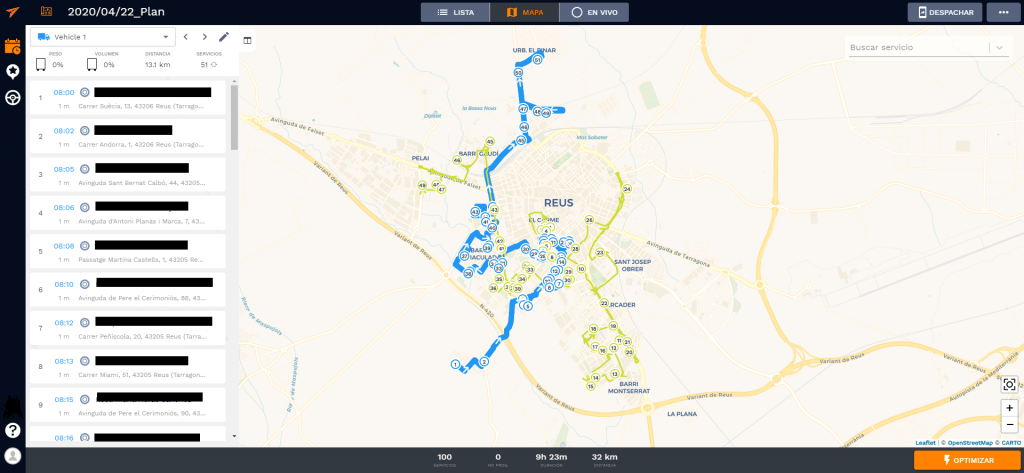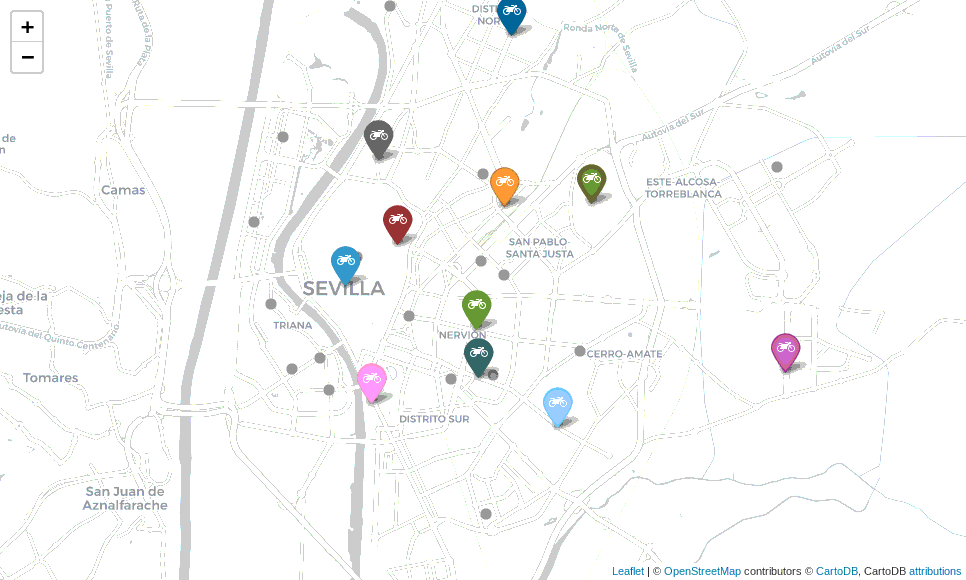Logistics

Don't be left behind and join the latest trend in the sector with Green Logistics
In the last year, especially marked by the pandemic resulting from COVID-19, a new trend has become popular in the logistics industry characterized by greater environmental responsibility in terms of resource use and process management. This trend is what we now know as Green Logistics.
In a global context in which climate change is already one of the main concerns for citizens, sustainability plays a leading role in the priorities of many companies. This concern also applies to many industries, such as logistics, due to the constant CO2 emissions produced while traveling. For all these reasons, sustainability is already a key element in logistics processes, which have been forced to generate while developing new models that integrate environmental vision into their processes.
Below, we explain what it is and how you can join the Green Logistics:
La Green Logistics refers to all those efforts and actions aimed at measuring and minimizing the impact of logistics on the environment. In short, a set of initiatives to reduce the environmental impact derived from logistics activity.

According to the article What is Green Logistics and what benefits does it provide of ESIC, various solutions are proposed in the logistics industry to make it more sustainable and, in short, it can become what we already know as Green Logistics:
Delivery in bicycles, electric motorcycles, tricycles, quadricycles, as well as in electric vans and cars: The use of these vehicles would significantly reduce the emission of CO2 to the environment and would reduce current levels of pollution within large cities.
Autonomous vehicles: Mobile autonomous driving lockers that carry the package to the place of delivery, where the vehicle stops, waits for the customer to pick up their package from the assigned locker with a pin code and follow their route until the next delivery (...). In this way, CO2 emissions would be significantly reduced and the delivery of packages would be expedited.
Urban minihubs: To reduce pollution in cities and traffic jams caused by the increasing number of vehicles that enter and leave them every day, it is proposed to place minihubs within cities that avoid such journeys (...). This reduces CO2 emissions and offers a distribution solution that is closer and more convenient to the customer.
Mobile fleet management: These are computer systems that allow us to adapt the route to customer demand on a daily basis, through the use of mobile minihubs that travel to the required delivery area.
Delivery robots: The robots, made up of a wheeled table where packages can be loaded, would follow the delivery people, helping them to carry the heaviest shipments (...). This system can be very useful in places in the center of cities where road traffic is prohibited.
Benefits of Green Logistics in your company
Optimization of resources: use strategies to make effective use of resources, such as shorter and more efficient delivery routes, making better use of vehicle capacities and keeping them in good condition, among others. An example of this is the success story of the company Alfil Logistics, since with an efficient use of their resources, they managed to improve their productivity by 15% for the urban distribution of goods in the city of Barcelona.
Reduces the harmful impact on the environment: Thanks to the use of new ways of proceeding in logistics (the Minihubs urban, electric vehicles or route optimization), the impact of logistics operations on the environment is reduced, thus minimizing the known carbon footprint and improving life in cities.
Economic savings: The new ways of doing things in the logistics industry, making it a much more sustainable sector, also bring economic benefits, since the use of electric vehicles, together with efficient route planning, can reduce and increase productivity while reducing fuel consumption, among others.
Improving your company's corporate social image and brand value: Nowadays, organizations understand sustainability as a priority issue, and this is reflected in their value proposition. For this reason, more and more companies are taking sustainability into account in their activities and, also, as a value proposition in their marketing and communication strategies, as is the case of Savinco

How to join Green Logistics?
With an effective use of resources and logistics processes, such as planning more efficient and shorter routes or the use of less polluting vehicles. All of this will not only contribute to environmental efficiency but also to greater economic profitability for companies.
Join Green Logistics with Routal Planner for efficient and sustainable route planning.

If you're still managing the last-mile routes of your ecommerce with Excel or Google Spreadsheet, don't worry, you're not the only one, but you probably need some help
Our goal is to make life in the last mile a little bit easier and more efficient. But before I go into detail, let me tell you the story of Eduard at Farmily.

Farmily It is a small business that distributes fruit and vegetables at home, direct from the farmer. I am a customer myself and I can say that I have eaten the best strawberries of my life. Even better than those in my small urban garden, which hurt my little pride as an amateur farmer.
As a good entrepreneur, Eduard decided to set up his own online store and manage the entire process: generating demand, preparing shipments and delivering to the customer. I was clear that if I wanted to provide a good service, I needed to control the entire chain. You can imagine that before Routal, management was completely manual. Several Excels, papers everywhere, the odd shipment lost, nothing that didn't happen to you.
For him, just organizing the routes could take several hours a day, sometimes it was hell when one of the delivery people failed him. One day that this work was unsustainable, delaying preparation in the warehouse and impacting the quality of the service and preventing customers from repeating. For Eduard, continuing to work in that way made it difficult for him to grow and did not allow him to live in peace.
The daily problems of managing an ecommerce manually last mile
- I spent many hours planning routes.
- The preparation in the warehouse was delayed
- The performance of the routes could be clearly improved (but I didn't have much more time)
- I didn't sleep well at night
Eduard wondered if there was another way to do things. You can imagine that living in the countryside (as a family of farmers) rethinking what was established was not very common in their environment but I was clear that I needed to change something. Fast.
I agreed with Eduard speaking through the Chat, (I recommend that you use it, we have experts in last mile logistics who can help you improve your processes) and he told me that he controlled Excel and that he managed the entire company with this tool but he didn't use any other application other than email and Whatsapp to communicate with the delivery people. Every day at Routal, we see hundreds of small businesses that operate that way and suffer with the manual management of their operations. There is life beyond the spreadsheet and it's a better life.
I encouraged him to Watch a video of less than 5 minutes upon how we could help you save time in your daily life. In addition, you could try the tool at no cost..
In less than 30 minutes I had understood how the tool worked and I had my next day's schedule ready and saved a vehicle. I'll let you imagine what happened the next day.
He came back, every day. Routal Planner became an indispensable tool for their daily lives. But Eduard wanted to save himself one more step. The step of having to download files and copying cells from one file to another. From the product team, we thought about how we could help so many users who use Google's online Excel and have to carry out that process every day. At that time (and a few hours of development later) the add-on was born that integrate Google Spreadsheet with Routal Planner for all licensed customers Gorilla 🐒
And Kong 👑
completely free of charge.

This integration allows Eduard and any Google Sheets user to easily and quickly import all stops/deliveries in a schedule with just one click. What used to be 10-15 minutes of downloading, adjusting and uploading is now literally 2 clicks (open the plugin, upload to the plan you need).
In this video you can see the entire process. Sit down, get ready, because 30 seconds are very intense (of which the upload time is no more than 10s).
This is the story of a traditional small business that didn't want to settle and decided to improve its daily lives. I encourage you to follow in his footsteps and not stop growing like Eduard. I leave you with the most repeated questions that our users ask themselves and that we like to help them answer.
Don't I have time?
I understand it, I share it and I am convinced of it. You've come this far and others have done it. You know you need to do something different like Eduard did. As a teacher I had when “I didn't have time to do my homework” said: Time is relative, use it properly and invest it; it will give you back much more time than it will take away.
Will it be complicated?
If you are managing your business with Excel and are able to remember each of the pages, files and how they are organized, I assure you that Routal Planner will seem like child's play to you. If we can explain the operation in just 4 minutes, it won't take you more than 20 to get everything working (and if you have any questions you can consult our documentation or let us help you in our chat).
I'm too small for all this
That's one of the reasons why many users don't dare. They always expect to be bigger, better, better-looking. In my opinion, you manage to get bigger, offer a better service and get customers to repeat when you do things right. Excel is fine when you start, but not forever. Adding specialized tools that help reduce process times, increase performance and improve delivery convenience makes companies better, bigger and more beautiful.
We have customers who started with just 3 or 4 deliveries a day but wanted to improve the service. They wanted to save time, to let the customer know where the delivery person is, to have information at all times, and much more. All of this has allowed their customers to repeat. Improving has allowed them to grow and what used to be a vehicle is now more than 10 in just one year. You can do it, too, and it's easier than you think.
What does this integration allow?
With the Routal Planner route optimizer integrated with Google Spreadsheet, we allow any company that manages its daily lives using spreadsheets/Excel to continue operating in the same way while obtaining the performance improvements of a route optimizer. Savings of more than 30% of last mile operating costs, reduce planning times by more than 80% and improve the service delivered.
Facilitating data migration further helps reduce management and planning times, making it an almost automatic process. The goal is for you to spend time on tasks that really add value to your business. Technology must be on the side of users and that data flow without any friction.
How much does this plugin cost?
Free, nothing, Free. It is part of the license Gorilla 🐒
And Kong 🦍
, so you can try it with your trial account (🤫 you only have 10 days, make the most of them).
Contact us for more details and any questions or suggestions you may have!

GManage recycling when no one has access to the recycling bins

The coronavirus crisis has had major repercussions on a global scale. From the economic shock resulting from a major financial crisis to social disruption and citizen unrest in this “new normal”. However, there are consequences of the pandemic that have not enjoyed the same media repercussion despite sharing their degree of importance, as is the case of sustainability and recycling.
An adverse effect throughout this prolonged pandemic year has been the strong demand for single-use products (mostly plastic), such as gloves, masks or protective screens, among others. The increase in this type of waste has skyrocketed and even today they pose a difficult problem of environmental unsustainability.
The decomposition of such waste in a sustainable manner has become an arduous task, since energy expenditure is high in addition to producing high polluting emissions in the incineration process. This, added to the already prevalent problem of “climate unsustainability”, could easily have led us to think of a real environmental disaster on a global scale. However, according to sources such as Eldiario.es, state that an adverse effect of the pandemic has been increased environmental awareness and an increase in domestic recycling.
According to this medium, more quantity is currently being recycled compared to previous “pre-pandemic” years, in addition to other types of hitherto invisible waste, such as those mentioned above, are also recycled. In this way, everything suggests that commitment to the environment, despite suffering such a dramatic situation as COVID-19, has occurred in an increasingly firm custom in homes, thus becoming a practice of irrepressible promotion.

And why the other heroes of the pandemic? Because despite the exponential growth in terms of environmental awareness, dealing with the pandemic situation has not been easy for recycling companies. There have been exceptional situations, as has occurred in some homes and surroundings in Chile, where it has not been possible to have suitable points to be able to recycle properly (the appropriate recycling containers were not available), which made it difficult to carry out this practice. This, together with the inconvenience of the strictest home confinement stages, posed a great challenge. Taking into account this problem, companies such as Chile Rembre have been able to find a solution. Thanks to your proposal S.O.S. Rembre, managed to overcome the obstacles of the pandemic by facilitating the practice of recycling thanks to their home waste collection service. The sole responsibility of the users who participated in this initiative was, solely, to collect all those containers or waste that could be recycled, such as cardboard, plastics, metals and glass.

Given the significant growth in operations, as each family had to visit practically door-to-door, Rembre was forced to look for a tool that would help them plan their waste collection routes more efficiently. Smartmonkey.io Planner it has allowed them to efficiently, quickly and safely manage all routes, reducing routes, fuel consumption and emissions by more than 30%, helping to have even more efficient and environmentally friendly operations. Without a doubt, a solidarity project committed to the environment that has made this crisis a more livable world.

This health crisis has shown us the importance of being able to count on a more sustainable world that must be preserved. Therefore, simple gestures such as the practice of recycling or improving the efficiency of last-mile operations can represent the necessary change towards a better planet.
We encourage you to recycle a little more and to improve the efficiency of your last mile operations in a simple way and completely free of charge with Routal Planner.

Today we bring an article that fills us with pride, we are very grateful to have met the team of Savinco and to be able to do our bit to the incredible social impact project that they are carrying out in Peru and Ecuador.
The case of Savinco Social Finance and how they create better futures in Latin America:

Most residents of rural areas of these countries face 3 problems when managing their income, the first is that There is no habit of saving which translates into a constant vulnerability because it does not generate a fund that they can access in the face of any need. The second problem is that, due to their low incomes and poor economic stability, banks and other financial institutions They deny the delivery of credits, but even when they do, we come to the third problem, which is the lack of financial education so this credit can cause more difficulties than solutions.
The mission of Savinco is to improve the quality of life of families through financial inclusion, they achieve this by providing a comprehensive solution that directly attacks the 3 problems mentioned, the first thing they do is form groups of between 15 and 40 people that function as a support network that meets once a month. These groups receive training on how to manage their finances by qualified coaches, at each monthly meeting of the group Savinco receives savings from each of the members and provides them with access to credit with better conditions than the market.
To manage all this, they use their technology. Qmobile a software that allows users to track their progress, their money movements and, above all, to make the entire process transparent.
The project of Savinco It bears the name of “Save to learn” and it opens the door for these people to achieve financial independence, but how big is this project?
These are currently the numbers:

The most surprising thing about these numbers is that they weren't enough for Savinco, they were still determined to provide more tools to their groups and decided to create Savinco Rural, a platform that operates in Ecuador to sell products between its groups. They carry tomatoes, lemons, passion fruit, corn and even honey that they buy in some groups to resell in others, creating their own market and boosting income capacity among their members.
This is when it comes in Routal, with hundreds of different locations for each group and more than 19,000 members, it became very difficult to manage product shipments and movements. Our software allowed you to Savinco optimize their daily routes in order to reach more people and bring smiles where there were none before.
We invite you to follow this beautiful project on:
https://savinco.org/
https://savincorural.com/
https://www.facebook.com/SavincoEcuador
If you too have a social project that you think we can contribute to, don't hesitate to contact us!

Managing deliveries is a jungle, but there are cases where there is light at the end of dense and dense nature. Today we will talk about one of them and how they managed to solve the problems they faced when launching a new division focusing on last-mile offices.
Alfil Logistics Success Story:
Alfil Logistics is a company with 20 years of experience in the market, manages more than 300,000 shipments annually and has more than 400 employees. They had the objective of growing through a new service that would offer a comprehensive logistics solution for e-commerce and decided to do so through a new division that they called Alfilxpress.
El 95% of Alfilxpress deliveries were to private homes, this was the first problem since the systems they had been using were not optimal for last-mile transportation. Another weak point they had was that they did not have real-time information about their offices and what they did have was in different systems.
In addition to these problems, they had a high staff turnover as they handled high peaks in demand and had little time to plan their routes every day. This is how their exhaustive search for a solution began to help them optimize their service, enrich information and improve decision-making.
When they started using Routal they saw an improvement of a 15% of productivity in their delivery companies, they managed to reduce the number of vehicles they used in Barcelona, improved the quality of information and thus reduced multiple errors (such as constant problems they had with delivery addresses).
15% improvement in productivity
One of the big headaches of shipping management is failed deliveries, Alfilxpress I managed to reduce them considerably thanks to the fact that our platform offers a system to notify consumers that their package is close to arriving and also allows us to link addresses with the delivery time windows selected by customers.
Another great advantage is that now Alfilxpress you can track your vehicles live, see the comments of each incident and be able to react quickly to any unforeseen event, all thanks to the visibility we provide on our platform.
Just like Alfilxpress, hundreds of customers are discovering the benefits and tools it offers Routal to be able to cross the jungle of deliveries.
We hope this article was useful to you and if you have any questions don't hesitate to contact us!

In this article, we'll talk about what roundabouts and organizations have in common.. Let me start with the obvious differences:
- Un roundabout is a road construction designed to facilitate traffic flow at intersections that cross roads.
- Una organization is an administrative structure and administrative systems created to achieve goals or objectives with the support of people themselves, or with the support of human talent or other similar characteristics.
The question is:
What do a roundabout and an organization share?
Before we can answer that question, we need to understand its use. In Europe, the use of roundabouts is widespread (25,000 in the United Kingdom, 50,000 in France, etc.). In recent decades, its implementation has grown a lot. The reasons are obvious: They reduce the number of accidents, improve the speed of passage, reduce pollution and are cheaper to maintain.
Different scientific studies have demonstrated the benefits and benefits of Roundabouts front traffic lights (traffic lights go...). The question that one can ask is why a country like the United States has barely 7,000 roundabouts, when in terms of surface area and inhabitants it far exceeds all European countries?
The answer lies in the fear of change. Everyone knows how a traffic light works (even my 4-year-old daughter knows when it can pass). Our decisions behind the wheel in front of a traffic light are automatic, requiring no mental effort. On the other hand, venturing into a roundabout requires maximum concentration to avoid a collision. I still remember learning to drive and having to go through the big and dreaded Plaça Espanya Barcelona, it was almost like going into hell... and I think it still is for many drivers.
Fear of change usually causes an opinion contrary to a new proposal (no matter how many studies say that the change will improve some aspect). This reasoning sometimes reminds me of our sector, logistics. Not infrequently do we encounter people within organizations who, because of this fear of change, are unable to see the potential for improvement of a new tool or process.
Oddly enough, the opinion of the population regarding the construction of a roundabout and the use of route optimization tools are very similar. The percentage of people against building a roundabout ranges from 60%-80%. A number similar to the number of companies that decide that they are not interested in saving logistics costs by 30% through a route optimization solution such as Routal.
Imagine getting through the first call, convincing the management team and the head of operations. Queda the difficult task of convincing the end user. The one who may view your solution with suspicion and disbelief. The question that person usually asks is the following: “A tool that will make my life easier, make my work 30% more efficient than me and save me an hour a day on something as complicated as route planning? I know who will be the next to go to the strike lists...
The fear of change, combined with a fear of losing a job, generates a very high aversion to change. I don't blame them, it's natural and it perfectly fulfills the saying of “Little Virgin, little virgin, let me stay as I am”, or what is usually said in the world Tech,”If it works, don't touch it”.
In any case, I think that in a world as changing as the current one, with competition always on our heels, doing things the same way, because it has always been that way, is much more dangerous than starting to improve processes and use new tools and technologies. With clear common sense, but in the Long Run, I think or do organizations evolve and adapt or die out.
I think that is one of the main risks for organizations: The lack of talent in their teams that leads companies to not know how to adapt to new changes and condemns them to extinction. Xavier Marcet explains very well in just a minute.
In conclusion, companies able to adapt to changes, manage the talent of their teams and know how to manage change are much more likely to survive in an environment as changing and uncertain as the current one.
Xavier Ruiz — CEO

Post inspired by Freakonomics Ep 454 Roundabouts

Sant Jordi is always a special day, books, roses, queues and people, lots of people. Everyone is out on the street, enjoying a magical day for both children and adults. It is the day of the year when the most books are sold, 7.5% of annual sales In the city of Barcelona.

This year will be special. We'll have to spend it at home, enjoying a good read, our recommendation for these days The Black Swan by Nassim Taleb. This year we will save ourselves the hassle of Las Ramblas and we will have to buy the roses online. Without a doubt, a special year.
We want to take advantage of this important date to see the success of initiatives that, in a normal year, would hardly have achieved such overwhelming success.
One of our customers Santjordiacasa.com is using Highway as a tool to optimize the distribution of roses on such a special date as Sant Jordi.

Thanks to the power of the Highway route planner, they have been able to grow in deliveries and reach customers that would have been impossible for them before.
Like them, hundreds of other customers are entering a world such as home delivery. A channel that had often been completely forgotten. Thanks, or unfortunately, COVID-19 has forced the launch of new marketing channels such as Ecommerce and its own distribution and home delivery.
We are seeing this in our traditional customers, distribution companies to the HORECA channel that are converting to home distributors overnight.
Pastry shops such as Cropics they were able to deliver all the Easter monkeys in record time and have the detail of leaving a monkey at my wife's grandmother's house 😁. These types of details make being able to help small businesses make you proud of the work you do and of seeing how you can help more people around you.

We are in a very difficult time for many companies and families. There is little help to get through this crisis and reaching those people we can help is always a challenge. I encourage you to share our story, the story of our users and customers, companies that are embarking on a new adventure, delivery. Without experience, without processes, but with a desire to fight and face the corona, you are not alone.
We won this together.

The distribution on demand is an industry that is growing at a very high speed. New companies appear every day, especially in the market for food, beverages and deliveries of perishable products. And the competition is wild. Efficiency is a key metric in the “I want it all and I want it now” era and the most critical part is what happens from when a new order is placed until it is delivered.
Today I want to focus on the problem of sending new orders, that is, how to decide which courier service the order should be assigned to when an order enters the system. This is because the dispatch today is not addressed systematically. Optimizing the dispatch system can minimize delivery time and improve customer satisfaction.
The operating paradigm of companies that deliver on demand can be divided into two different types:
- Operations based on a single warehouse are those operations focused on a single tank. This warehouse has several dealers and the programming is done once to obtain an order list; usually grouping orders by area. Amazon Prime is a good example of this paradigm.
- Operations based on multiple warehouses are those operations that rely on choosing the order in one of the multiple warehouses and delivering it to a customer. In this case, the delivery people are scattered around the city, and once a new order arrives, it is assigned through a shipping process to one of the multiple delivery people. Companies such as Uber, Just Eat, Delivero, etc. operate this way.
The problem of dispatching is solved more or less satisfactorily in the first scenario thanks to the possibility of linking together a list of deliveries and considering it as a Traveling Seller Problem (Traveling Salesman Problem) with some pre-clustering restrictions (OK, I know that TSP is an expensive problem, but... come on, it's about Amazon).
On the contrary, in the second scenario, it is not so clear that the problem is being optimally addressed. How can a new incoming order be added to a running scenario? There are tons of variables to consider:
- Can the courier make multiple collections before starting to deliver?
- Can an already assigned order be reassigned to another courier service?
- Do all orders have the same priority? (for example, all orders must be delivered no later than 30 minutes after placing them)
Do orders need to be delivered by a particular vehicle? - ...

Modeling this scenario can be quite challenging, and that's why SmartMonkey has been working on this problem for a while. We call our solution Online Programming Optimization Model (OSOM) (Yes, branding isn't one of our strengths 😅, but phonetically it sounds like “incredible” and that's pretty fun). OSOM can model business restrictions and find a feasible solution to the dispatching problem.
In the simulation below, we have modeled a world where:
- A courier service can be assigned multiple pickups and deliveries at the same time
- and the first next service of each messaging service is fixed and cannot be reassigned in subsequent iterations.
The visualization contains twenty iterations of the world divided into two steps:
1. New incoming services are marked in gray.
2. Services are dynamically assigned to deliverers to optimize overall delivery time.


I want to share a personal experience that matters. Smartmonkey.io is headquartered in Barcelona, the second region with the most Coronavirus infections in Spain. The second worst country in the world that is dealing with this virus.
Hospitals in our area are about to be overwhelmed by the demand for ICU patients. According to friends who work in hospitals, the capacity of ICU beds in the region of Catalonia is about 800 beds, of which 600 are currently occupied. But we are still a long way from the top. Studies suggest that it will be at the end of April . Even so, 4 long weeks with the exponential growth of infections and expected deaths. Tragedy is the smallest word we could find to define this situation.

But it's not all darkness and death. A few days ago, a guy from Canada was starting to use Highway, our route optimizer. Use was normal for new customers, Testing the examples , taking their first small steps in a very powerful tool, but at the same time easy to put into operation.
We always like it talk to our new users . Not only is it very useful to know more about them, but being able to provide the best possible customer service is priceless. Sometimes you find incredible projects behind @gmail .com accounts like Ahmed Sagarwala's father-in-law in Canada.

It is helping not only the poor, but also people who have decided to isolate themselves to prevent the spread of the virus. Delivering medicines to these people is not just worrying about them, but doing everything they can for society. We are very proud that yesterday 16 people received help thanks to Ahmed's father-in-law and Highway. He told us that next week it will increase to 50 or more. We'll be here helping them.
If you read this and know someone, we could help. Spread the word. We know how difficult it can be, #quédateEnCasa and support Ahmed and others around the world.
Xavi Ruiz, CEO of Routal





.png)


